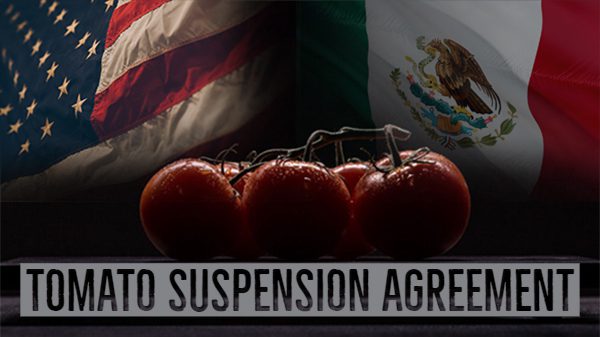In reply to the article published at the Blue Book Services on June 19th, I must respond to the numerous mis-statements made by the Florida Tomato Exchange in response to a letter I sent to the U.S. Congress protesting actions taken by the US Commerce Department in the Tomato Suspension Agreement.
As chairman of the economy commission of the Mexican Senate, I am familiar with how the antidumping laws work, both in Mexico and the United States, as well as under the rules of the World Trade Organization and NAFTA.
These rules are enforced in each country in legal or quasi-judicial proceedings, and as such must be based on law and fact. Actions taken under these laws are not supposed to be driven by domestic politics. Here are just some of the problems that I noticed with FTE’s reply to my letter to some US Congressmen:
• Contrary to FTE’s claims, there was no legal underpinning for the Commerce Department’s decision to terminate the 2013 suspension agreement. There has never been a final finding of dumping against Mexican tomato growers, nor a finding that Mexican imports are injuring FTE and its members and not one violation of the 2013 Agreement was ever found by the Commerce Department or placed on the record of that proceeding.
• Although FTE claims no politics were involved, the decision to terminate the agreement was clearly political. Commerce cited no reason to terminate that agreement other than the demands of FTE, which were buttressed by similar demands from Florida lawmakers. Neither of these are factors listed in US law.
• Without any factual or legal justification, FTE is pushing Commerce to put in place a border inspection mechanism without any legal authority to do so. Such a non-tariff barrier – actually a quota in disguise – is not permitted under US law, NAFTA or the WTO, so the antidumping process FTE defends has been stretched until it is legally unrecognizable.
• Finally, FTE’s attempt to equate Mexico’s tomato imports with Chinese overcapacity in steel underscores the extent to which they are relying on hyperbole rather than law and facts. Mexico ships tomatoes to the United States. The United States ships corn, wheat, apples, soybeans and many other agricultural products to Mexico. That is why NAFTA has been, and the USMCA will be, so successful. Trade goes both ways, not just southward. Those agreements are based on rules, and those rules must be followed in a way that helps both of our nations. Otherwise, there will be repercussions in the agricultural sector on both sides of the border.
As I mentioned in the letter that I sent to the congressmen, a “successful relationship, supposes looking for solutions through dialogue and the construction of beneficial agreements for both nations,” our countries should work together in a new agreement that improves the agricultural sector, specially Tomatoes industry, and guarantees the employment of hundreds of vulnerable workers on both countries.
Regards,
Gustavo Madero
Senator



